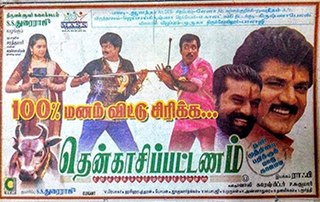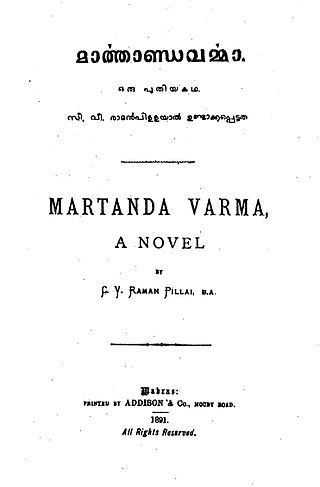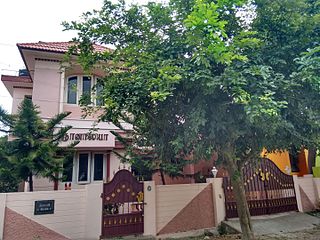
Malayalam, the lingua franca of the Indian state of Kerala and the union territories of Lakshadweep and Puduchery, is one of the six classical languages of India. Malayalam literature comprises those literary texts written in Malayalam, a South-Dravidian language spoken in the Indian state of Kerala. The first travelogue in any Indian language is the Malayalam Varthamanappusthakam, written by Paremmakkal Thoma Kathanar in 1785. Malayalam literature has been presented with 6 Jnanapith awards, the second-most for any Dravidian language and the third-highest for any Indian language.
This article contains information about the literary events and publications of 1879.

Tamil literature includes a collection of literary works that have come from a tradition spanning more than two thousand years. The oldest extant works show signs of maturity indicating an even longer period of evolution. Contributors to the Tamil literature are mainly from Tamil people from south India, including the land now comprising Tamil Nadu, Kerala, Eelam Tamils from Sri Lanka, as well as the Tamil diaspora.

Maraimalai Adigal was a Tamil orator and writer and father of Pure Tamil movement. He was a fervent Tamizh Saivite. He wrote more than 100 books, including works on original poems and dramas, but most famous are his books on his research into Tamil literature. Most of his literary works were on Saivism. He founded a Saivite institution called Podhunilaik Kazhagam. He was an exponent of the Pure Tamil movement and hence considered to be the father of Tamil linguistic purism. He advocated the use of Tamil devoid of Sanskrit words and hence changed his birth name Vedhachalam to Maraimalai.

Uttamadhanapuram Venkatasubbaiyer Swaminatha Iyer was a Tamil scholar and researcher who was instrumental in bringing many long-forgotten works of classical Tamil literature to light. His singular efforts over five decades brought to light major literary works in Tamil and contributed vastly to the enrichment of its literary heritage. Iyer published over 90 books in his lifetime, on a variety of matters connected to classical Tamil literature, and collected over 3,000 paper manuscripts, palm-leaf manuscripts and notes of various kinds.

Mayilattam is a 2004 Malayalam-language action comedy film directed by V. M. Vinu. It stars Jayaram in dual roles as the hero and villain, along with Rambha, Indraja, and Jagathy Sreekumar in the pivotal roles. The film was a commercial success at the box office. It was an Onam release of 2004.
Sacchidananda Bharati I , was a Hindu sant and religious leader of the 17th century. He was the Jagadguru of the Hindu matha Sringeri Sharada Peetham from 1623 to 1663, and is believed to have saved it from attack by spiritual means.
Prathap or Pratap is a name used in India as a man's given name, or as a surname.
Ramanuja Kavirayar was a Tamil savant and poet. Living in Madras, he dominated the world of Tamil letters and had several eminent Tamil scholars as his students.

Thenkasi Pattanam is a 2002 Indian Tamil-language comedy film directed by Rafi Mecartin and produced by S. S. Durairaju. The film stars Sarath Kumar and Napoleon as the male leads while Samyuktha Varma, Devayani, and Aswathi Menon play the female leads. This film is the Tamil remake of the Malayalam film Thenkasipattanam (2000). The music was composed by Suresh Peters, while the editing was done by Harihara Puthran. The film was released on 21 June 2002. It was one of the year's Tamil blockbusters and marked the last film of Samyuktha Varma before retiring from the film industry.
Ariyanatha Mudaliar was the Delavoy (General) and the Chief Minister of the greatest of the Nayaka domains established by the Vijayanagar viceroy and later ruler of Madurai, Viswanatha Nayak (1529–64). He assisted in running a quasi-feudal organisation of regions called the poligar or the palayakkarar system where the regions are divided into palayams and are independently governed by poligars or palayakkarars.

Frances Antony Cyril Raja known professionally as Vijay Antony, is an Indian music composer, playback singer, actor, film editor, lyricist, audio engineer, and filmmaker working predominantly in Tamil cinema. He made his debut as music composer in 2005. He is the first Indian Music Director to win the 2009 Cannes Golden Lion for the song Naaka Mukka advertising film in the Best Music category. The song was played at the 2011 Cricket World Cup. He made his acting debut film Naan in 2012. He is best known for his roles in action thriller films such as Naan (2012), Salim (2014) and Pichaikkaran (2016).

Marthandavarma is a historical romance novel by C. V. Raman Pillai published in 1891. It recounts the history of Venad (Travancore) during the final period of Rajah Rama Varma's reign and subsequently to the accession of Marthanda Varma. Set in Kollavarsham 901–906, the story revolves around three protagonists, Ananthapadmanabhan, Subhadra and Mangoikkal Kuruppu, who try to protect the title character from Padmanabhan Thambi and Ettu Veetil Pillamar who plan to oust him from the throne of Travancore. The novel utilizes rich allusions to the Indian subcontinent and Western, historical, cultural and literary traditions.

Samuel Vedanayagam Pillai (1826–1889), also known as Mayavaram Vedanayagam Pillai, was an Indian civil servant, Tamil poet, novelist and social worker who is remembered for the authorship of Prathapa Mudaliar Charithram, recognized as the "first modern Tamil novel". Vedanayagam's ideals of women's liberation and education are reflected in the novel. He has a well-known great-grandson, Vijay Antony, who is an actor in the Tamil film industry.

Manohara is a 1954 Indian Tamil-language historical fantasy film directed by L. V. Prasad and written by M. Karunanidhi. Starring Sivaji Ganesan, T. R. Rajakumari, P. Kannamba and Girija, the film was based on the play of the same name by Pammal Sambandha Mudaliar. It was released on 3 March 1954. The film was simultaneously shot in Telugu and Hindi under the same title. Those versions were released on 3 June 1954.
The Malayalam novel is an important part of Malayalam literature. This article focuses on novels, written in Malayalam language, a Dravidian language spoken predominantly in the Indian state of Kerala and the Lakshadweep islands.

Gnanalaya is one of India's largest private libraries with rare first edition books, founded by B. Krishnamurthy and his wife Dorothy.

Vedhala Ulagam is a 1948 Indian Tamil-language fantasy film directed and produced by A. V. Meiyappan, and written by P. Neelakantan. Adapted from the play of the same name by Pammal Sambandha Mudaliar, the film stars T. R. Mahalingam, K. Sarangapani, Mangalam, K. R. Chellam and C. T. Rajakantham. It was released on 11 August 1948 and became a commercial success.

R. Narayana Panickar was an Indian essayist, playwright, translator, lexicographer, novelist and historian of Malayalam. He was credited with over 100 books but the best known among them are the seven-volume work, Kerala Bhasha Sahitya Charitram, a comprehensive history of Malayalam literature up to 1951 and Navayuga Bhasha Nighantu, a lexicon. He also wrote a number of novels and translated several works including Purananuru, Akanaṉūṟu and Silappatikaram. He was also a historian and published works such as Thiruvithamkoor Charitram and Kerala Charitram. Sahitya Akademi honoured him with their annual award in 1955.













